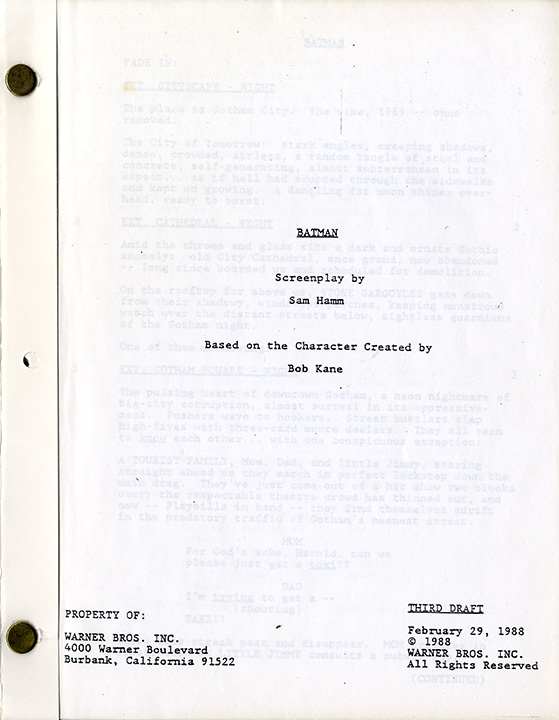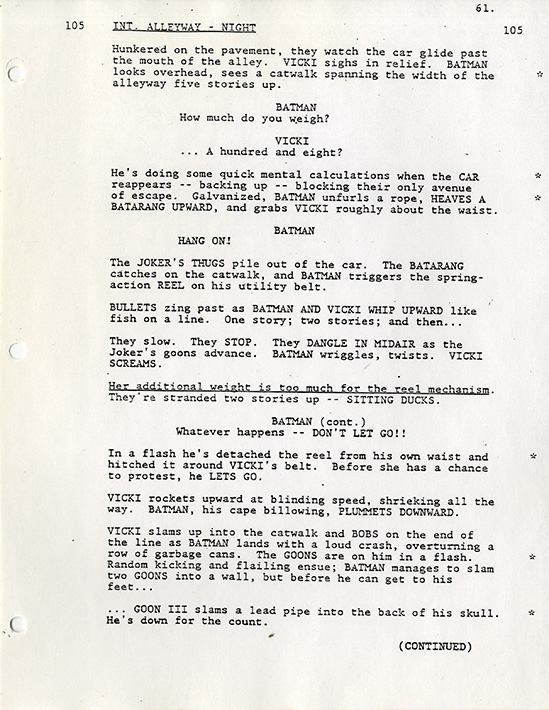Tim Burton (director) BATMAN (Feb 29, 1988) Third draft screenplay by Sam Hamm
Vintage film script, printed Guber-Peters production company wrappers, brad bound, quarto, 112 pp., light wear to edges of yapped covers, fine in VERY GOOD+ wrappers.
The modern superhero movie got its start with Richard Donner’s SUPERMAN: THE MOVIE, released in 1978, and Tim Burton’s BATMAN, released in 1989. There had been a Batman movie serial released in the 1940s and a campy Batman television series that was extremely popular in the 1960s. Regardless, the 1978 SUPERMAN and the 1989 BATMAN — both of them big-budgeted films with big stars, and both of them huge hits — were the templates for the superhero blockbusters we see today.
The Batman character and his alter-ego Bruce Wayne were created by artist Bob Kane and writer Bill Finger, and first appeared in Detective Comics #27, in 1939. Kane and Finger’s comic book superhero had in turn been inspired by such pulp fiction characters as JUDEX — filmed as a serial by Louis Feuillade in 1916 — and Walter B. Gibson’s THE SHADOW — who attained his greatest popularity as the hero of a radio show in the 1930s.
Screenwriter Sam Hamm (born November 19, 1955), a self-described “failed cartoonist” and comic book fan with one prior screenplay to his credit (1983’s NEVER CRY WOLF), was approached by director Tim Burton to write the BATMAN screenplay shortly after Burton himself had been hired to work on the project by producers Jon Peters and Peter Guber. The project had a long development process involving numerous other writers and directors prior to Burton and Hamm. In contrast to prior treatments, Burton and Hamm wanted to give the film a darker, more serious tone inspired by graphic novels like Alan Moore and Brian Bolland’s BATMAN: THE KILLING JOKE and Frank Miller’s THE DARK KNIGHT RETURNS. Though numerous other actors were considered for the parts, Michael Keaton was ultimately cast as Bruce Wayne/Batman, and Jack Nicholson as his antagonist, the Joker.
This screenplay draft closely resembles the completed film, although some lines have been trimmed and others improved on. Some scenes and sub-plots have been revised or omitted, for example:
- The film omits a sub-plot in which crime reporter Alexander Knox (Robert Wuhl) investigates Bruce Wayne and concludes he is the Batman.
- The film omits a scene between Knox and a 60-ish gossip columnist in which they discuss Bruce Wayne’s dating habits.
- In the screenplay, crime kingpin Carl Grissom is described as “fat, fifty, and utterly without charm.” In the film, he is played by Jack Palance who is slim and comparatively charming. The film adds a line by Palance to Nicholson, “You’re my Number 1 guy,” apparently so that Nicholson as Joker can repeat the line later while doing an impression of Palance’s voice.
- The film adds a scene where Bruce Wayne visits the alley where his parents were murdered and leaves a flower to commemorate the anniversary of their deaths. The screenplay and movie diverge significantly from the comic books by making the Joker himself (in his youthful pre-Joker days) responsible for Wayne’s parents’ deaths, just as Wayne/Batman would later be responsible for turning that same small-time criminal into the Joker.
- In the screenplay, romantic interest Vicki Vale (Kim Basinger) figures out on her own that Bruce Wayne is the Batman. In the movie, Wayne almost tells her, but is interrupted. Later, it is revealed to her by Wayne’s dedicated butler, Alfred (Michael Gough). The screenplay also includes a sequence — omitted in the film — where Vicki dreams she witnesses the death of Wayne’s parents.
- The screenplay includes a scene — omitted in the film — where Batman chases the Joker on horseback. That same omitted scene introduces us to Batman’s future ward and sidekick, Dick Grayson (Robin). Dick Grayson/Robin does not appear in the completed movie.On the completed film, screenwriter Hamm shares screenplay credit with Warren Skaaren who had previously worked on Burton’s BEETLEJUICE. Though director Burton had only made two features at that point in his career, PEE WEE’S BIG ADVENTURE and BEETLEJUICE, and was working under the control of a major studio (Warner Brothers) and two very powerful producers, he still managed to turn BATMAN into a personal project through his design concepts and by making the story about what he called a “duel of the freaks.” To wit, both Batman and his white-faced nemesis, the Joker, are portrayed as the kind of freakish outsiders who we have come to recognize as archetypal Burton protagonists. 850.00
Out of stock
Related products
-
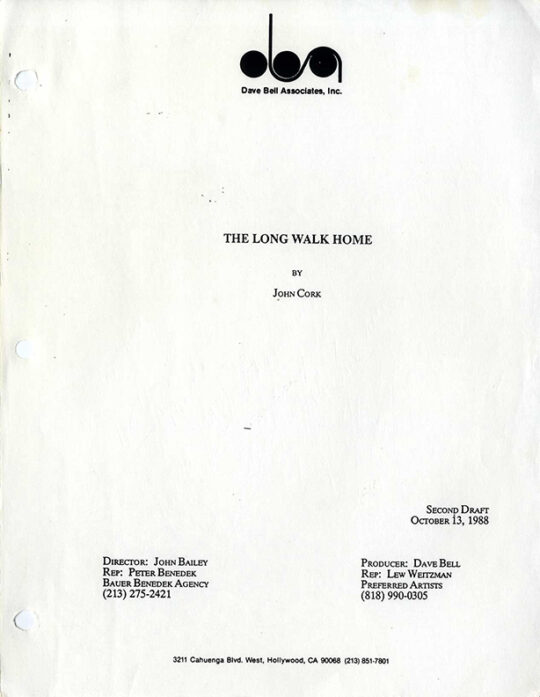
LONG WALK HOME, THE (Oct 13, 1988) Second draft film script by John Cork
$375.00 Add to cart -
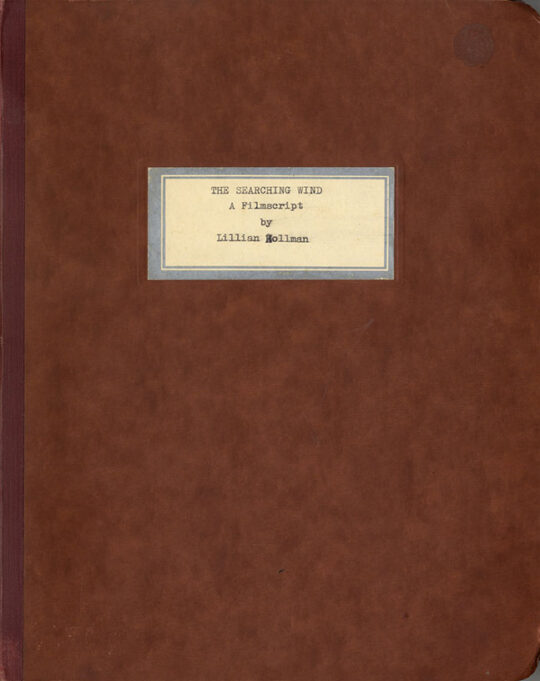
SEARCHING WIND, THE (Nov 7, 1946) Final White script by Lillian Hellman
$1,500.00 Add to cart -
![LES CREATURES [THE CREATURES] (1966) French film script](https://www.walterfilm.com/wp-content/uploads/2021/04/LesCreaturesSCR_a-540x689.jpg)
Agnès Varda (screenwriter, director) LES CRÉATURES (1966) Film script
$1,500.00 Add to cart -
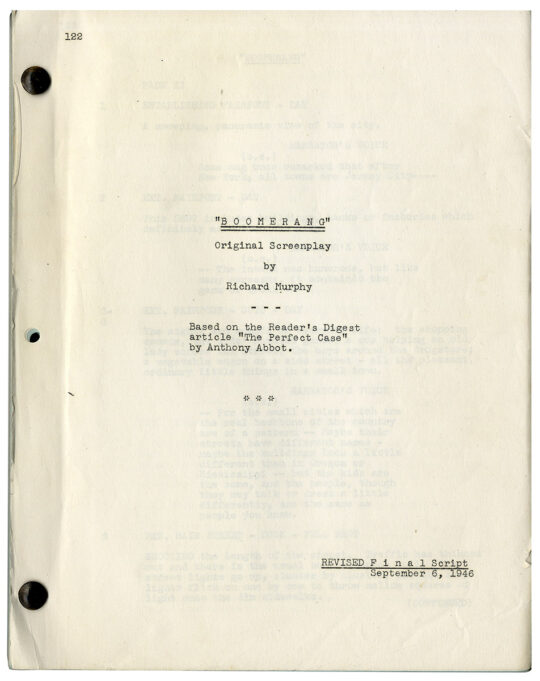
(Film noir) BOOMERANG (1946) Revised film script by Richard Murphy
$850.00 Add to cart

